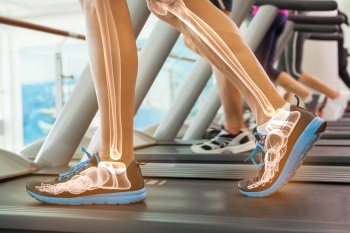
The biomechanics of the human foot comprises three primary arches, which are the medial longitudinal arch, the lateral longitudinal arch, and the transverse arch. These arches, constructed of bones, ligaments, and tendons, play a vital role in providing support, stability, and shock absorption during weight-bearing activities. The medial longitudinal arch, running along the inner edge of the foot, acts as a natural spring, absorbing the impact of each step and distributing the body's weight evenly. Its counterpart, the lateral longitudinal arch, assists in maintaining balance and stability by bearing weight on the outer edge of the foot. The transverse arch, situated across the midfoot, adds further structural integrity to the foot and facilitates weight transfer during movement. Together, these arches work harmoniously to adapt to various surfaces, absorb shocks, and propel the body forward efficiently. If you are interested in learning more about how the arches of the foot work in harmony with the bones, ligaments, and muscles, it is suggested that you confer with a podiatrist who can provide you with interesting information.
If you have any concerns about your feet, contact Robert Hutchison, DPM, FACFAS from Lower Keys Foot & Ankle Surgery. Our doctor can provide the care you need to keep you pain-free and on your feet.
Biomechanics in Podiatry
Podiatric biomechanics is a particular sector of specialty podiatry with licensed practitioners who are trained to diagnose and treat conditions affecting the foot, ankle and lower leg. Biomechanics deals with the forces that act against the body, causing an interference with the biological structures. It focuses on the movement of the ankle, the foot and the forces that interact with them.
A History of Biomechanics
- Biomechanics dates back to the BC era in Egypt where evidence of professional foot care has been recorded.
- In 1974, biomechanics gained a higher profile from the studies of Merton Root, who claimed that by changing or controlling the forces between the ankle and the foot, corrections or conditions could be implemented to gain strength and coordination in the area.
Modern technological improvements are based on past theories and therapeutic processes that provide a better understanding of podiatric concepts for biomechanics. Computers can provide accurate information about the forces and patterns of the feet and lower legs.
Understanding biomechanics of the feet can help improve and eliminate pain, stopping further stress to the foot.
If you have any questions please feel free to contact our office located in Key West, FL . We offer the newest diagnostic and treatment technologies for all your foot and ankle needs.
